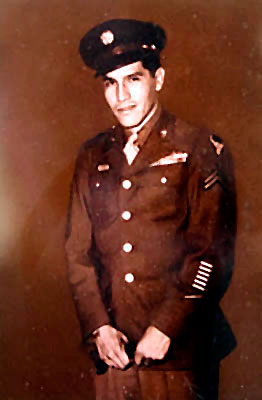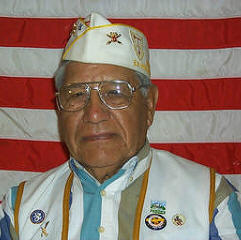
Established April 14, 1942
 |
American Ex-Prisoners of War
A not-for-profit, Congressionally-chartered veterans’ service organization advocating for former prisoners of war and their families.
Established April 14, 1942 |


Ralph Rodriguez Jr. before the US entered WWII.
|

Ralph Rodriguez Jr. At The Baton Rouge Nat. Convention 1998
|
||
| Last Name | First Name, Middle Init. | Nickname | |
| Street Add. | City | State | |
| Zip | Spouse | ||
| Conflict | Branch of Service | Unit: | |
| Theatre of Operation | Military Job | Where Captured | |
| Date Captured | Time Interned | Camps | |
| Date Liberated | Medals Received | Age at Capture | |
| After the War ... | |||
The day after Pearl Harbor, the Japanese attacked the Philippines, where about 1,800 men from the 200th and 515th Coast Artillery Regiment were among those deployed. The New Mexico group is credited with being the "first to fire" on the enemy. Against overwhelming odds and with little support, U.S. and Philippine fighters withstood the Japanese assault for four months before being ordered to surrender.
After being taken prisoner they were forced to endure the Bataan Death March, on which 1,000 Americans and 9,000 Filipinos perished en route to the POW camps where they would be interned for three years. And where they suffered under horrific conditions until they were liberated in 1945. Ralph would say many years later he still had "very vivid memories" of the torture he and his fellow soldiers suffered: the "denial of medicine," the "beatings," the "brutality that was not human. I was very lucky," he said. "I never was afraid of the Japanese, and I didn't have to beg them for anything."
Rodriguez, at 94, recalled in another interview how the prisoners would sleep underneath "hospital" buildings that stood on stilts as blasts blew the leaves off trees. Conditions were unsanitary, with prisoners sharing food like unclean cooked rice. "We managed to accept it. That's why we made it back. We didn't fight it. We didn't fight the situation, but we took care of each other."
Rodriguez is a native New Mexican. He moved to Albuquerque when he returned from war. He celebrated his 100th birthday there with family and friends in October 1917.